#heer halewijn
Text
youtube
youtube
I'm back on my bullshit.
#Garmarna#scandinavian ballads#folk music#ballads#brun#herr olaf#translated lyrics#folk songs#folk ballads#traditional music#outlandish knight#heer halewijn#lady isobel and the elf knight#music#Youtube
8 notes
·
View notes
Note
do u have any fic recs? 👀
sure thing! here's a baker's dozen:
— they kill us for their sport (asoiaf)
You need only remember this. We are Martells. And we are not weak.
— wake us, and we drown (the silmarillion)
Míriel and Mairon, and the last days of Númenor.
— entropy (hp)
In 1998 Hermione begins her seventh year at Hogwarts. In 1944, Tom Riddle does the same.
— sharp (greek mythology)
A sword does not need a fine lineage, her father told her once. It only needs to be sharp.
— as sirens call the sailors (one thousand and one nights)
Scheherazade and Julnar are very different women.
— hear reproach no more (jewish mythology)
There was a girl who lived in Ecbatana in Media, beautiful and pious, and every man - and one demon - who saw her fell madly in love.
— the perennial lily (arthurian mythology)
The golden age is ended. And still, time flows on, like the river past Castle Astolat.
— seventh (lady isabel and the elf knight)
"How many before me?" she asks through numbed lips.
— bargains cruelly made (heer halewijn)
"Kiss me, Princess Magtelt, and I will tell you how to kill a firebird.“
— your love (déjà vu) (rebecca)
Troubled marriages and other things that end in gunshot wounds
— three-moon nights (cat on a hot tin roof)
Skipper wasn't simple, just saw things more simply, and that was something altogether different.
— no such thing as no standards (it's always sunny in philadelphia)
It’s a pretty fucking short list. (Or; Dennis, and the lines he hasn’t crossed.)
— AITA for accusing my father of multiple crimes on his own news station? (succession)
Reddit's view of Kendall Roy over the years.
85 notes
·
View notes
Photo

JANSEN, Hendricus ("Henricus"). Dat Liedekin van Heere Halewijn (The Ballad of Lord Halewine), 1903. by Halloween HJB Illustration of an ancient Dutch folk tale. "Although the first printed version only appears in an anthology published in 1848, the ballad was first written down in the 13th century, but dates back to pre-Christian times and is one of the oldest Dutch folk songs with ancient subject matter to be recorded." [Wikipedia] https://flic.kr/p/2nAwveu
3 notes
·
View notes
Photo
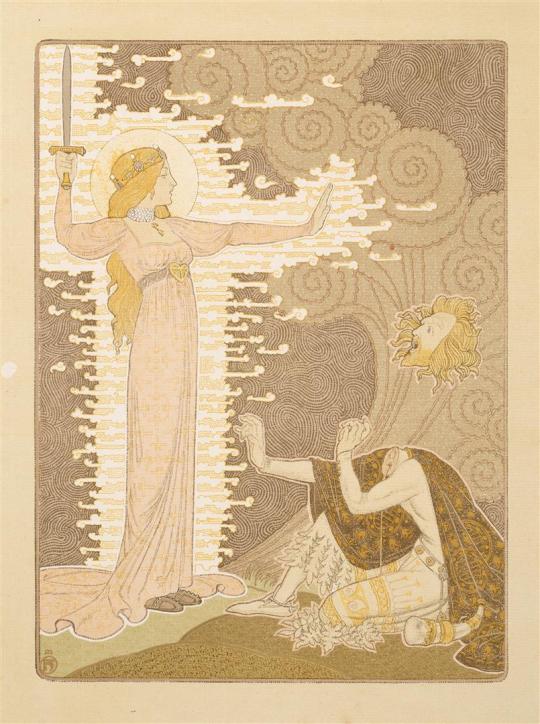
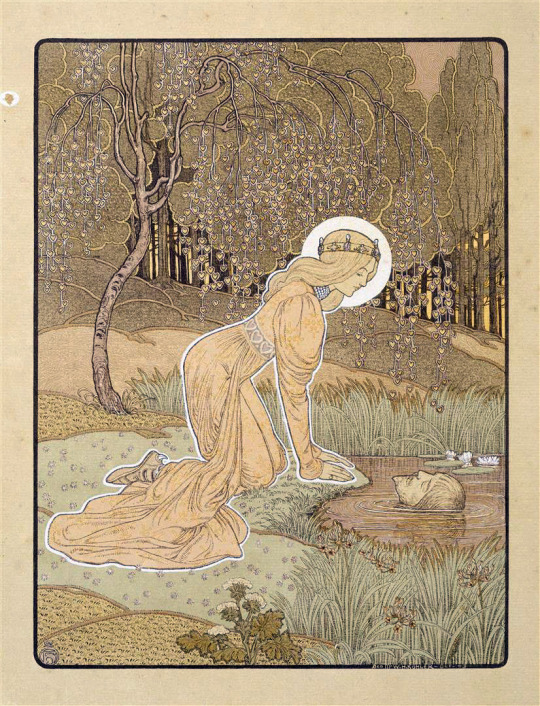
Illustration for Dat Liedekin van Heere Halewine (The Ballad of Lord Halewine), by Hendricus ("Henricus") Jansen.
374 notes
·
View notes
Text
The Ballad of Lord Halewijn
or rather, of the princess who murdered his sadistic ass.
A Dutch ballad from the 13th century that shares characteristics with ballads such as the English Lady Isabel and the Elf Knight, the Scottish May Colvin, the Flemish Roland and many more throughout Europe.
I couldn’t find a full rhyming translation of this awesome ballad, so I decided to try my hand at one myself. Content warning for violence.
Lord Halewijn sang a song so sweet,
All who heard it came to him on hurried feet.
A princess heard telling of this air,
She was as beloved as she was fair.
She went to ask: “Oh father mine,
Oh father, may I go to Halewijn?”
“Oh no, my daughter, no not thou,
Those who go, ne'er return, this I cannot allow.”
She went to ask: “Oh mother mine,
Oh mother, may I go to Halewijn?”
“Oh no, my daughter, no not thou,
Those who go, ne'er return, this I cannot allow.”
She went to ask: “Oh sister mine,
Oh sister, may I go to Halewijn?”
“Oh no, my sister, no not thou,
Those who go, ne'er return, this I cannot allow.”
She went to ask: “Oh brother mine,
Oh brother, may I go to Halewijn?”
“Tis the same to me whence thou should depart,
As long as thy honour thou will guard,
And the crown on thy head remains unmarred!”
Then to her chamber she did retreat,
And dressed herself so fine and neat.
What did she change for the robe she shed?
A shift that was softer than silken thread.
What did her fine corset hold?
Stiffened it was with bands of gold.
What did she have on her skirt so red?
Each stitch was with a gold button beset.
What did she have on her bonny gown?
It was stitched with pearls all the way down.
What did she wear on her fine blonde braid?
A golden crown that heavy weighed.
To her father’s stables she found her way,
And led the noblest of all his steeds away.
Astride she mounted, for ride she could,
Singing and ringing she rode through the wood.
When to the middle of the woods she came,
She found the lord that bore Halewijn’s name.
“Hail,” said he, and came to her side
“Well met, fair maid, so bright and brown-eyed.”
Through the forest the two of them rode,
And many a word was said on that road.
Soon they came to a field of gallows tall,
And those that hung there were women all.
Then onto her he did impart:
“Since thou the fairest of women art
Thou may choose thy death, it’s thy time to depart.”
“If no other choice thou would offer a maid,
I, above all, will choose the blade.”
But first remove thy tunic fine,
For maiden's blood spills far, like wine.
To stain thee would be a regret of mine.
Not yet had the garment given way,
But his head already at his feet did lay,
Yet his tongue still had these words to say:
“Go in yonder wheat field near,
Blow upon my horn so clear,
That all my absent friends may hear.”
“In yonder wheat I shall not go,
And on thy horn I shall not blow.”
“Then to yonder gallows go with haste,
Take the pot of salve that there is placed,
To salve my neck, which the blade defaced.”
“To yonder gallows I shall not speed,
I shall not salve thy neck where it did bleed,
A murderer’s counsel I will not heed.”
By the hairs she lifted up that head,
And in a spring she washed it soaked and wet.
Astride she mounted, for ride she could,
Singing and ringing she rode through the wood.
And when she had gone half the way,
Halewijn's mother came to her to say:
“Fair maid, did thou see my son today?”
“Thy son lord Halewijn went hunting before,
Thou won’t see him in thy lifetime anymore.
Thy son lord Halewijn is dead,
In my lap I carry his wretched head,
His blood now colours my apron red.”
When she came upon her father's gate,
She blew the horn like a man to proclaim her fate.
And when her father heard his horn resound,
He was rapt to see her safe and sound.
A grand feast was held in the banquet hall,
The head was placed on the table amongst it all.
#there are multiple versions of course#I chose one of the simpler ones#I'll put some sources in the replies#dutch ballad#nederland#nederlands#dutch#heer halewijn zong een liedekijn#heer halewijn#lord halewijn#ballad
61 notes
·
View notes
Photo

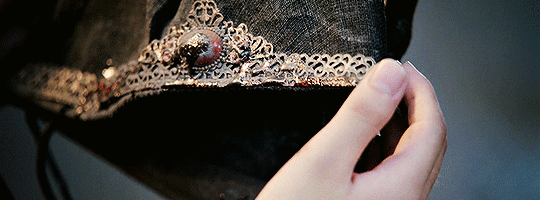

Huaisang, restrain your grief.
#theuntamededit#mdzsedit#cqledit#cql#mdzs#fatal journey#fatal journey spoilers#nie huaisang#i have no idea what possessed me to use this line from heer halewijn#except that it Slaps#in dutch it's better:#'moordenaers raed en doen ik niet'#i can't really go into how much i love this medieval tale#except there's a beheading and it's rad#and this translation should be credited to:#holger olof nygard#my edit#okay i changed the caption so the credit seems a bit empty now#but the other lines run:#go yonder into the corn / and blow upon my horn / that all my friends you may warn#'into the corn i will not go / and on your horn i will not blow / a murderer's bidding i will not do'#this is what halewijn requests of the king's daughter#but halewijn is a murderer#who has just been beheaded by the king's daughter for exactly that#so she's like how about no#anyways this has nothing to do with nhs... and yet#(there's a second stanza too)#go yonder under the gallows-tree / and fetch a pot of salve for me / and rub my red neck lustily#'under the gallows i will not go / nor will i rub your red neck no / a murderer's bidding i will not do'
256 notes
·
View notes
Note
I have an enormous fixation on Child Ballad No. 4 (I wrote extensively about it here: https://meradorm.tumblr.com/post/615205177002246144/trigger-warning-for-some-academic-discussion-of if you have a lot of time). So I want to say Heer Halewijn: https://youtu.be/FNh1Cq2EgFs But I'm not Dutch, I'm an American, so you can have Black Girl/Where Did You Sleep Last Night: https://youtu.be/28KEs9xq6X0
youtube
did not know this one, thank you for sharing!
[send me an ask with a folk song in your language that truly makes you feel something]
4 notes
·
View notes
Photo
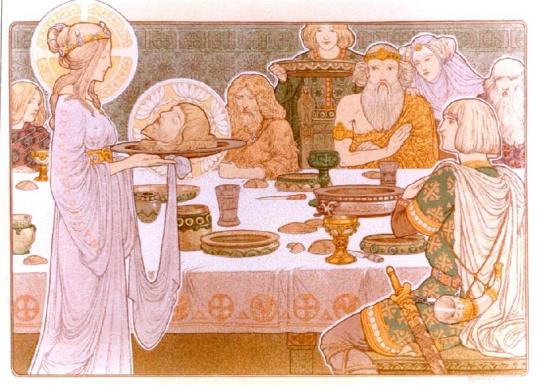
Heer Halewijn
Heer Halewijn is a Dutch ballad from the 13th century. It tells a story about a princes who is searching for Halewijn, a singing knight. Her whole family is against the idea except for her brother. When she meets Halewijn however, he gives her the choice on how to die. She wants to be beheaded instead of hanging because beheading was reserved for royals. With a neat trick, the princes manages to cut off the head of Halewijn instead and takes the head back to her home. They hold a feast and the head is placed on the table as a trophy.
Now the reason why I am mentioning this Dutch medieval ballad is because its origin is most likely much older, predating Christianity. What its exact origin is, we do not know but I would like to share a few theories.
First theory that exists is that Halewijn is somehow connected to the old runic inscription on a sword sheath of Bergakker, Netherlands, about which I have made a post. The inscription mentions that the blade is property of Haþuþȳw. Maybe this name refers to the mysterious Halewijn. We have no idea who this Haþuþȳw was.
Another theory about Halewijn's story is that it is in fact Celtic in origin. We know that Celtic warriors chopped off the heads of their enemies and that sometimes these heads were bound on the horse of a warrior. Heads were carefully conserved and considered sacred amongst the Celts. Posidonius, a Greek philosopher, travelled through Gaul and described how his Celtic hosts showed him the skulls of their enemies. In the ballad, Halewijn's head asked the princes to conserve his head with a salve, this is a clear connection to Celtic beliefs.
Another clue that confirms the link to a Celtic origin can be found in a very similar Scottish ballad called Tam Lin.
In this ballad, young women are warned about Tam Lin. One woman does meet him and gets pregnant. Tam returns and reveals that he is not a human and in fact is an Elf. With a neat trick, the woman manages to pull Tam off his horse in order to free him from the Elf queen who captured him.
The talking head in the story of Halewijn can have both Celtic and Germanic influences, look at the Germanic Mimir and the Celtic story about the hero Finn. The location of where the ballad was created is most likely Brabant, both a province of the Netherlands and Belgium. It was exactly on the border of Germania and Gaul so it is no surprise if the story contains elements of both Celtic and Germanic beliefs.
The ballad of Halewijn was only written down in 1830. Before this, the story was told orally through the centuries. We do not know how old exactly it is but when you look at the themes, it is presumably much older than Christianity in Europe. Whether it is Celtic or Germanic, it certainly is a beautiful remainder of Europe's pagan past.
Here you can listen to the song
https://www.youtube.com/watch?v=mRJszzu-O_A
34 notes
·
View notes
Text
Fic meme
I’ve been tagged by @cuttoothed and I’ve been too lazy to do it for months.
“Post the first line of your last 10 published fics, then tag 10 people.”
1. Le chat qui n’avait pas encore de bottes (Le Chat Botté, backstory)
“Il était une fois un chat de sorcière qui aimait assez son état.”
Bonus: English version: “Once upon a time, there was a witch's cat who loved his position.”
2. Heer Halewijn’s Song of Blood (Traditional ballad)
“Everyone who hear his song, they say, wants to be with him. And the princess wants it too.“
3. Walking with Spiders (The Magnus Archives, Web!Martin)
“Martin decided quite a long time ago that he didn't mind letting Peter fuck him. As ways to fall deeper into the Lonely go, it's not the worst one.“
4. Dreams of Death (The Magnus Archives, Oliver/Jon smut)
“Jon doesn't remember any part of this statement.
He understands in whose dream he is, thanks to Georgie's frustrated explanations. The tape with "Antonio Blake's" second statement had disappeared when they looked for it. But he has read the first one. He remembers. He remembers lots of things these days.”
5. Au revoir (Captain Marvel, Maria/Carol)
“Sa vie pourrait être ici à nouveau, pense Carol“
6. The Flower and the Fairy (Original mind control porn)
“Once upon a time there was a knight named Richard. For years he had searched for the Fern Flower, which grants wishes.”
7. Squeeze (The Magnus Archives, The Governor/George Gilbert Scott)
“Ancient Greeks told that inspiration came from the Gods; but though there are Muses for poetry and music, there is none for Architecture.“
8. On the Edge (The Magnus Archives, Jon/Martin)
"I can tell you now," Martin says. He knows his face is very pale. He almost looks like a Lukas. "Peter, he... he thought that I would no longer want to. But he doesn't understand. He understands the Lonely very well, of course, but not the Beholding. The way you are now... half of me is just burning to give you all the answers. Please ask."
9. Office Hours (The Magnus Archives, Elias/Tim)
"I'm sorry Jon is being so difficult, Tim."
"Difficult? He's a stalker! What are your standards? Just fire him! Demote him!"
10. Afterschool Special (The Magnus Archives, Anatomy Students/Dr Elliot)
“At the first knock at his door, Lionel suspects nothing.
Later he'll wonder whether he should have found it hollow or impersonal, but aren't all door knocks? “
And I’m tagging... @anysin-can-hadplen, @andersandrew, @fataldrum, @somuchbetterthanthat, @always-keep-writing, @mnemosynelethe, @forest-of-stories, @hundred-miles-down and whoever wants.
2 notes
·
View notes
Text
De rauwe werkelijkheid van 1545
De rauwe werkelijkheid van 1545
In 1545 moet de Raad van Vlaanderen vanuit Mechelen ingrijpen in het aanslepend dispuut tussen Ieper en Nieuwkerke. De wevers van Nieuwkerke hebben zich nu gewaagd aan het produceren van de ‘grote draperie’ lakens en hebben daarmee de Ieperse wetten aan hun laarzen gelapt. In datzelfde jaar benoemt keizer Karel de heer van Boezinge tot hoogbaljuw van Ieper. Ik heb het over Nicolas Halewijn die…

View On WordPress
0 notes
Text
Anonimo ~ Halewijn il Signore · Heer Halewijin
Anonimo ~ Halewijn il Signore · Heer Halewijin
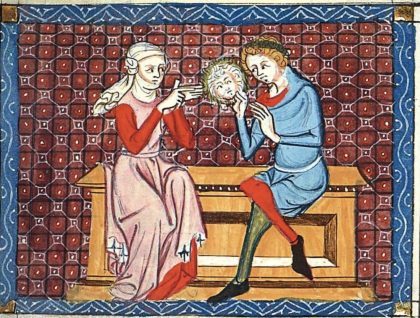
HALEWIJN IL SIGNORE
heer halewijn il signore cantava una canzone chi la sentiva da lui correva e questa dal suo lontano castello sentì una figlia di re dolce e pura che tanto bella e tanto amata era subito dal caro padre corse andò gli disse o padre posso io ad halewijn andare ma no figlia mia tu proprio no chi là va parte più non è mai tornata e dalla cara madre corse andò le disse o madre…
View On WordPress
0 notes
Text
Attempting to translate "Heer Halewijn" to English- just fragments so far
(it doesn't always rhyme and the meter can be a bit irregular but that the case with the original ballad too)
-Sir Halewijn sang a lovely song
So all who heard it to him would come
And a king's daughter heard of this
Both beautiful and loved was she
So to her father she did come
"Oh father,to Halewijn let me go"
"Oh no my daughter, you won't go
For all who do return no more"
Then to her mother did she come
"Oh mother, to Halewijn let me go"
"Oh no, my daughter, you won't go
For all who do return no more"
Then to her sister did she come
"Oh sister, to Halewijn let me go"
"Oh no my sister, you won't go
For all who do return no more"
{...}
-" Greetings"he said "You maiden fair"
"Greetings" he said" Brown eyes so clear"
"Come with me then. Untie your hair."
As many a hair as she untied
So many a bitter tear she cried.
{....}
"Oh go out into the corn*
And blow upon my horn
So of my death my friends may know"
"Into the corn I will not go
Upon your horn I will not blow
A murderer's bidding I won't do"
"Go look below the gallows
And fetch a pot of salve
And with it smear my wound so red"
"Below the gallows I will not look
Your pot of salve I won't fetch
A murderer's bidding I won't do"
She took the head up by its hair
And washed it in a river clear
As she was riding to her home
She met Halewijn's mother on the road
"Fair maiden, have you seen my son?"
"Your son, Sir Halewijn, is dead
Here in my lap I hold his head
And with his blood my apron's red."
*corn as in grain in general, not 🌽
This ballad is from the same group as "Outlandish knight" / "May Colvin"/ "Brun"/ "Un'Eroina/ "Lady Isabel and the Elf knight" etc. In this version the princess character actively seeks out the serial killer, beheads him and has a feast in her honour when she returns ( rather than quietly sneaking back in and getting blackmailed by her own parrot)
undefined
youtube
#ballads#flemish folk#dutch folk#low countries#my attempt at translation#constructive critism welcome#child ballad 4#lady isabel and the elf knight#the outlandish knight#heer halewijn#child ballads#roud 21#judith and holofernes#bluebeard#badass princess#folk songs#folk music#13th-14th century#work in progress#Youtube
12 notes
·
View notes
Note
do you know any other fics similar to the one you recommended here? 🖤post/665143054466007040
i do, actually!
— Hear Reproach No More (The Book of Tobit); There was a girl who lived in Ecbatana in Media, beautiful and pious, and every man - and one demon - who saw her fell madly in love.
— Sharp (Medea); A sword does not need a fine lineage, her father told her once. It only needs to be sharp. There is no sharper blade than Medea.
— Seventh (Lady Isabel and the Elf Knight); “How many before me?” she asks through numbed lips.
— Bargains Cruelly Made (Heer Halewijn); “Kiss me, Princess Magtelt, and I will tell you how to kill a firebird.”
— hole in my heart like a wishing well (The Robber Bridegroom); When a young woman's father announces her engagement to a mysterious gentleman, she is far from thrilled—she knows something is wrong with him, even if no one else seems to see it.
— The Coming of Spring (Beauty and the Beast); Happily Ever After is not quite what either expected.
47 notes
·
View notes
Text
The Red Fiddle
read it on the AO3 at http://bit.ly/2CVdt6U
by Astlay
A retelling of the Heer Halewijn folk ballad.
Every week we saw him entering the bar, his red fiddle ready to play, his smile ever so contagious.
Every week we waited for the ones he took to come back, but to no avail.
Curse you, Hale and your bloody fiddle.
Words: 3242, Chapters: 1/?, Language: English
Fandoms: Original Work, Fairy Tales & Related Fandoms, Heer Halewijn (folklore)
Rating: Teen And Up Audiences
Warnings: Creator Chose Not To Use Archive Warnings
read it on the AO3 at http://bit.ly/2CVdt6U
0 notes
Photo
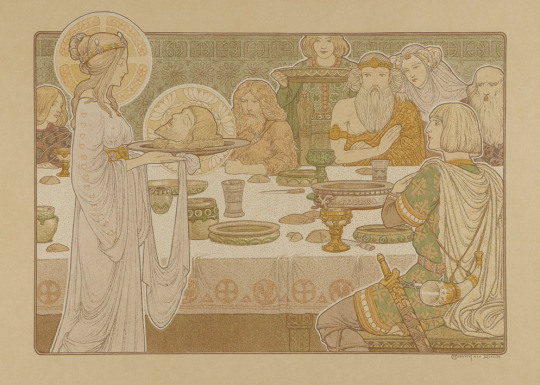
The princess serves the head of Heer Halewijn on a plate.
Illustration for Dat Liedekin van Heere Halewine (The Ballad of Lord Halewine), by Hendricus ("Henricus") Jansen.
#and there was a banquet... i like the implication that they might eat his head#illustration#m. art#Heer Halewijn#appetites
46 notes
·
View notes
Text
Halewyn’s Legend, as Wikipedia helps us to get started wit a relevant semple text--------------> Heer Halewijn (also known as Van Here Halewijn and in English The Song of Lord Halewijn) is a Dutch folk tale which survives in folk ballad. Although the first printed version of the song only appears in an anthology published in 1848, the ballad itself dates back to the 13th century and is one of the oldest Dutch folk songs with ancient subject matter to be recorded. The story of lord Halewijn itself is even older and contains elements going back to Carolingian times. Many of its mythemes range back to Germanic pre-Christian legends.[citation needed] The song's subject matter is similar in many respects to several Germanic songs circulating in the Middle Ages Europe, notably close to the English ballad May Colvin or False Sir John and its variations, Lady Isabel and the Elf Knight. The legends may have been the prototype of the Legend of Bluebeard. Several versions of the story of Halewijn exist. In all of them, Lord Halewijn (Halewyn) is either an evil man, a magician, a demon or a faery lord who sings a magical song. Every woman (maiden) who hears this song is drawn towards him and goes to meet him in his forest, where he kills them. In one version he beheads them, in another he touches them with his magical sword upon which they turn into stone. A princess (In one version her name is given as 'Machteld', but in most versions she remains nameless) hears the song and is drawn into the forest to meet Lord Halewijn. In some versions she knows about his reputation but has a plan, in others, she is warned on her way by a white bird. She meets Halewijn and lets herself fall under his spell. Together they ride to a field of gallows where he declares his intention to kill her, but impressed by her beauty, he allows her to pick her own death. The princess chooses to be beheaded, but implores Halewijn to take off his shirt so her blood will not stain him. (But first lay off your upper robe for maiden's blood it spreads so far if it stained you, it would be my grief) Lord Halewijn lays off his sword and starts to undress, which was the princess' plan. In some versions, while he is pulling his robe over his head, the cloth of the robe muffles the magical song. In other versions, as he pulls the robe over his head, he can no longer use his spellbinding gaze. Other versions have him turn his back to the princess while undressing. Whatever version however, while undressing, the princess awakens from his spell and cuts off the head of the now helpless Halewijn with his own sword. The princess takes the head with her and triumphantly returns home. On her way back she meets Halewijn's mother who asks her about her son. The princess then reveals to her Halewijn's fate. In the kings castle, the head is shown all over and the tale ends with a great celebration. One version however adds a footnote saying that the princess remained unmarried all her life because no suitor could ever match the passion she felt for Lord Halewijn.
Herr Halewijn
0 notes